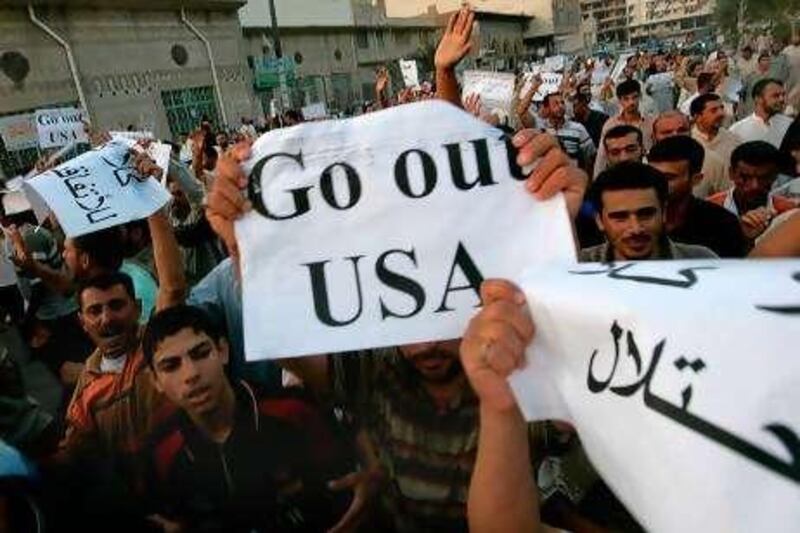BAGHDAD // Deadlocked negotiations over the future Iraqi government have spotlighted waning US power in Baghdad and underlined the difficulties facing Iraq as it gains more independence, analysts and politicians here say. The United States is in the process of reducing its combat forces, with troop numbers due to be cut to 50,000 by the end of next month. While the US still has a sizeable military presence - and the most powerful in the country - the step is symbolic of a wider scaling back in direct US involvement in Iraqi affairs.
"America's power in Iraq isn't the same as it once was, even compared to a few years ago," said Abed al Hassani, a politician in the State of Law alliance, the group led by the incumbent prime minister, Nouri al Maliki. "Before 2008, American officials had a very direct role in decision making and problem solving, they would block some political ideas, they would get very involved in the details of negotiations. That is not the case anymore."
The contrast between that former approach and US involvement in the current political impasse was stark, Mr al Hassani said, citing Washington's failure to have its advice listened to before or after the election. "America's inability to influence politics is now clear, they have made various recommendations but they go nowhere, for example with the de-Baathification," he said. A pre-election purge of candidates over alleged links to the outlawed Baath party helped lay the ground for a sectarian and highly divisive election. US officials voiced concerns over the purge but, amid much confusion and abuse of the constitution and spearheaded by Iran's political allies in Iraq, it went ahead anyway.
Indeed the divisions were obvious yesterday when the Iraqi parliament indefinitely postponed its first session, its caretaker speaker said. "We are postponing the session until further notice because the political entities failed to reach any agreement," Fouad Massum, who as the oldest member of parliament holds the post of caretaker speaker, told a news conference, Agence France-Presse reported. "We held a meeting this morning with the heads of the parliamentary blocs and we agreed to give more time to political entities to reach agreement regarding the selection of a speaker and his two deputies."
Bahar al Araji, an official with the Sadrist movement, said Washington was being forced out of Iraq, against its will. "The Americans would still like to make decisions for Iraq and they want a government that has an American flavour," he said. "They've made that obvious and the last trip by [the US vice president] Joe Biden was designed to achieve that." While asking that the United States and international community continue to offer constructive support to Iraq, Mr al Araji said the end of America's post-2003 invasion role would bring with it an easing of dangerous political divisions.
"America leaving is the solution to our problems, not the cause of those problems," he said. There have been suggestions in the American media - sourcing unnamed US officials - that troops will remain in the country after the 2011 final pull out date, set by the Status of Forces Agreement (Sofa) between Washington and Baghdad. Iraqi politicians, at least in their public statements, say there is no question of the Sofa timetable being changed. However, the independent political analyst Ali Abbas Mohan dismissed such claims as posturing and said that, while diminished, US influence remained significant.
"Iraqi officials and politicians take an anti-American line because that is popular with the public," he said. "In truth, if you went through parliament, you would find most MPs have strong links with the Americans, and have visited America. "A lot of the politicians realise the government is weak and they are only too happy to have America playing a role, just as long as it is kept secret." "Obama's methods have failed here," Mr Mohan said. "He wanted to let the Iraqi politicians find their own solutions, but the reality is that that doesn't work, you need to wave a big stick to get things done here."
@Email:nlatif@thenational.ae





